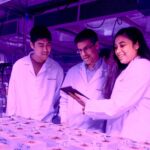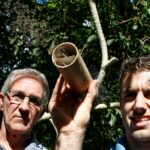
Modesta Abugu: Improving Sweetpotato Flavor for Nutrition Security
By Brandon Hopper | Ph.D. student Modesta Abugu is researching flavor compounds in sweetpotatoes with a goal of increasing consumption and improving global nutrition security....Continue reading "Modesta Abugu: Improving Sweetpotato Flavor for Nutrition Security"

Blog: Archea, Microbial Superheroes?
Jabeen Ahmad, September 27, 2022 | Food insecurity is a concern now and in the future. Globally, the United Nations estimates that about 690 million people are food insecure. By the year 2050, the world population is expected to reach nine billion people, requiring food supplies to double. ...
NC State part of $26 million grant to study microbiomes
Heidi Reid, September 7, 2022 | NC State is taking part in the National Science Foundation Engineering Research Center for Precision Microbiome Engineering (PreMiEr) to research genetically engineered microbiomes. ...Continue reading "NC State part of $26 million grant to study microbiomes"

Exploring the Social, Ethical Sides of Microbiome Engineering
Nash Dunn, September 7, 2022 | At NSF center, NC State to Lead Research on Societal and Ethical Implications of Emerging Technologies...Continue reading "Exploring the Social, Ethical Sides of Microbiome Engineering"

Researchers Propose New Framework for Regulating Engineered Crops
Mick Kulikoswki, September 1, 2022 | A Policy Forum article published today in Science calls for a new approach to regulating genetically engineered (GE) crops, arguing that current approaches for triggering safety testing vary dramatically among countries and generally lack scientific merit – particularly as advances in crop breeding have blurred the lines between conventional breeding and genetic engineering....Continue reading "Researchers Propose New Framework for Regulating Engineered Crops"

NC State to Research Implications of Engineered Microbiomes with New NSF Center Grant
Deborah Strange, August 10, 2022 | NC State University is part of a five-year, $26 million National Science Foundation center researching microbiome engineering....
NC State Brings Expertise, Interdisciplinarity to Galapagos Consortium
Deborah Strange, July 29, 2022 | In joining the International Galapagos Science Consortium, NC State bolsters its current research and service on the archipelago....Continue reading "NC State Brings Expertise, Interdisciplinarity to Galapagos Consortium"

¿Será la edición génica una alternativa de corto plazo para hacer frente a la subida de precios de alimentos?
Gonzalo Muñoz y Mike Jones, March 29, 2022 | La edición génica es la metodología más reciente y por lo tanto es necesario crear nuevos marcos regulatorios, patentes y licenciamientos....
NC State University Awarded BioMADE Funding to Advance U.S. Bioindustrial Manufacturing by Educating Future Workers
With a new project funded by BioMADE — led by professor Gary Gilleskie — NC State will help train the workforce needed to advance bioindustrial manufacturing in the U.S....
NC State receives USDA/NIFA grant to evaluate societal impacts and foster sustainability of GE and nanotech in agriculture
February 10, 2022 | Khara Grieger, together with GES Co-director Jennifer Kuzma, will lead a $650,000 project that will support the responsible development of novel agrifood technologies to contribute to more sustainable food and ag systems. ...
Two Professors Named 2021 AAAS Fellows
Delborne and Watzin are recognized for their “scientifically and socially distinguished achievements.”...
Blog: Considerations for developing GMO crops around the world
Agriculture is changing and so are the technologies needed to improve it. Scientists should be allowed to develop genetically modified (GM) crops to provide options for smallholder farmers who depend on a successful harvest for their livelihood. That position was highlighted in a panel discussion featuring biotechnology leaders at the Genetics Engineering and Society colloquium organized by the third cohort of the AgBioFEWs fellowship. The question that informed this colloquium was, who makes the decision on which GM crops are developed around the world?...Continue reading "Blog: Considerations for developing GMO crops around the world"

Khara Grieger to Co-lead Knowledge Transfer Efforts for New $25 million Phosphorus Research Center
October 8, 2021 | Khara Grieger will co-lead Knowledge Transfer efforts between researchers and stakeholders for NC State’s new $25 million NSF STEPS Center....
Blog: We must do better…
Todd Kuiken, June 11, 2020 | The following reflection was part of a special GES colloquium held on June 5, 2020, discussing the new USDA regulations on GM crops. Which was held in the midst of national protests against police brutality. They are my personal reflections in support of #blacklivesmatter and the systemic racism and inequalities seen throughout our institutions....